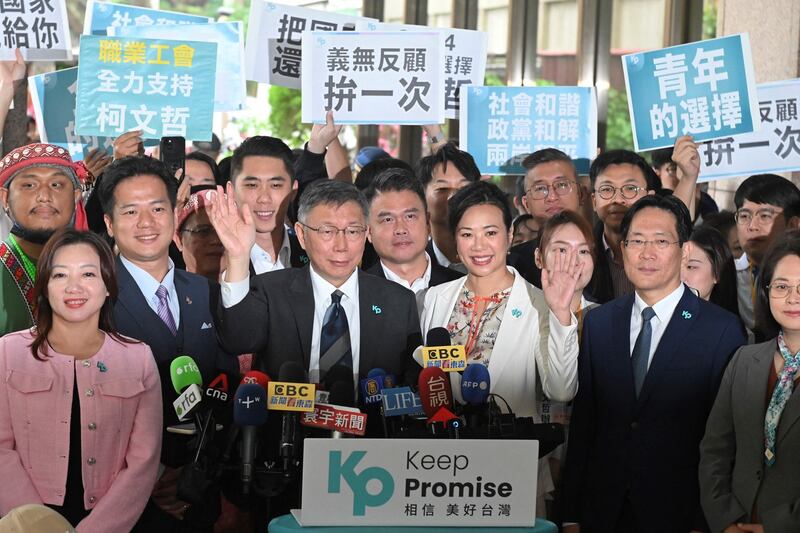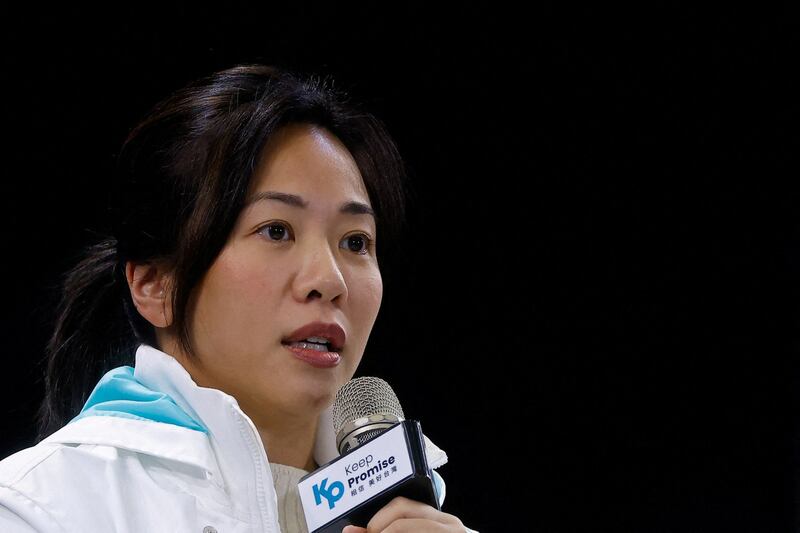Shin Kong heiress and Taiwan People's Party vice-presidential nominee Cynthia Wu didn't say much when she was announced as the running mate for transplant surgeon Ko Wen-je in next month's election, putting down the microphone after a few brief words.
Yet during a recent interview with RFA Mandarin's "Asia Wants to Talk" chat show, the U.S.-born Wu switched easily between Mandarin, Taiwanese and English to chat non-stop about her experiences on the campaign trail and her vision for Taiwan's future.
Until she joined the presidential race in a decision that she says surprised even her, Wu was mostly known as an appointed member of the self-governing island's Legislative Yuan and the granddaughter of Wu Ho-su, who founded the Wu family's Shin Kong business empire.
From humble beginnings as a department store in Taiwan, Shin Kong grew into a conglomerate spanning the financial, security, manufacturing, consumer, medical and philanthropy sectors.

"Total surprise," Wu told host Simon Tai, when asked for her reaction to her nomination, which came soon after talks between Ko's "White Camp" Taiwan People's Party and the "Blue Camp" opposition Kuomintang broke down with no agreement on Nov. 24.
"The Blue and White camps didn't get together, so each party had to pick its own candidate for vice president," Wu said. "I only heard about it on day 50 [of the campaign], on the Friday afternoon, like everybody else."
Wu likened the surprise to that she felt when becoming a mother earlier this year at the age of 45.
She added: "You've just got to get on with it."
Business princess
Wu once held dual U.S. and Taiwanese citizenships but renounced her U.S. citizenship in 2014, and has been considered a surprising choice by many in Taiwan, who saw her as more of a business heiress and “princess” unfit for the cut-and-thrust of political life.
Asked if she was a "princess," Wu replied: "Why only label me as one thing? I'm also a mother, an insurance salesperson, I hold a financial analyst certificate issued in London, and I'm also a person who loves Taiwan."
She said she accepts who she is calmly, despite what she termed "political manipulation" that she said seeks to make her seem out-of-place in politics and even spoiled.
Wu doesn't just hold financial certifications -- she graduated as a double major in international relations and art history from Wesleyan College in Connecticut, and holds a master's degree in literature from the Courtauld Institute of Art in London.
Her resume includes stints as an investment analyst for a brokerage, and as assistant to former U.K. Conservative Party lawmaker Peter Lilley, now known as Lord Lilley.
Since returning to settle in Taiwan at the age of 25, she has also held a number of executive posts in Shin Kong subsidiaries, including vice president of its insurance division and executive director of its Shin Kong Life Foundation, experience she said is useful on the campaign trail.
Chinese influence claims
Wu says that trying to win votes is a lot like selling insurance.
"The process is the same -- either you are trying to turn an opportunity into a sold policy, or you're trying to turn it into a vote," she said. "You have to leave no stone unturned."
Slated by her critics as an amateur due to her many gaffes, including misnaming government ministries and describing herself as "Chinese," Wu said Ko had told her that she should see the media as akin to sharks circling for a feed.
"He talks a lot, has a great sense of humor and won’t form a personal relationship with you," Wu said. "But he told me that I should be myself ... and even feed the sharks occasionally."
She has also been warned by colleagues in the Legislative Yuan that being in politics means being forced to cope with the fact that people gossip about you.
More seriously, Wu has been accused of being part of the Chinese Communist Party's United Front outreach and influence operation, after being named among "China's 100 Outstanding Women Entrepreneurs" in 2010.
Asked at the time if she was Chinese or Taiwanese, Wu told journalists that she was both.
"Chinese culture is in my DNA," Wu told Radio Free Asia. "I am a citizen of the Republic of China, but my ancestors are also from China."
The majority of Taiwan's 23 million residents identify as Taiwanese rather than Chinese, and have no wish to give up their democratic way of life to be ruled by Beijing, according to opinion polls.

Nonetheless, Wu has appeared to strongly endorse the status quo, in which Taiwan, which has never been ruled by the Chinese Communist Party nor formed part of the People's Republic of China, continues to govern itself as a democracy.
"I think Taiwan must maintain its peaceful and independent life," Wu said. "If China is willing to make way for communication and discussion with us, then it's likely we will talk to them."
Beyond that, she referred voters to Ko's maxim that peace across the Taiwan Strait is the best guarantee of the status quo.
"The status quo is being maintained, but what is up for negotiation is to restart talks," Wu said.
Cross-strait relations
Like Ko, Wu described the " 1992 Consensus" agreed by Taipei and Beijing as "vague."
Beijing has repeatedly castigated Taiwanese President Tsai Ing-wen for allegedly departing from the agreement by seeking a greater role for Taiwan on the world stage, and because she insists on government-to-government status as a prerequisite for talks with Beijing -- something Chinese officials would never agree to.
The "Consensus" has been widely criticized as meaning different things to different people -- for Beijing, it appears to mean that Taiwan's 23 million people should stop insisting on a distinctly Taiwanese identity, something China views as "pro-independence."
"If he gets into power, Chairman Ko would want to clarify the definitions [in the Consensus]," Wu said.
But asked if she believed Chinese President Xi Jinping when he said there was no timetable for invading Taiwan by force, Wu replied: "Taiwan can't put its future in the hands of a single person and their decisions."
"The more international connections Taiwan has, the safer it will be," she said, likening Xi's intentions to "the weather" over which Taiwanese have no control.
"Regardless of what the weather is doing, we can't leave our fate up to other people," Wu said.
Asked if she adds value to Ko's campaign or impedes it, Wu replied: "I think I add value for Taiwan, and for Taiwan as seen by the international community."
"I've seen my whole life how economic and diplomatic issues go hand in hand," she said. "So, moving from a commercial background into politics doesn't actually feel like a change of career, just a different track on the way to realizing some of my ideals."
